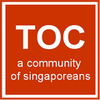 Casino
Casino
From “concerned”:
Hearing the news these days is worrying. Hearing the Las Vegas Sands Ceo assures Singapore on the casino project reminds me of the man in the gambling addiction advertisement that does something like this: “Give me your money, I know what I am doing, my luck is changing, etc, etc.”
The fact that many analysts feel that the casino project is too large for the government to allow it to fail is worrying. I believe that the government should pull the plug and not care about political face-saving if Las Vegas Sands
becomes bankrupt. I mean, why should the government gamble the people’s money on something that may not materialize as the next engine of growth? Since the government always pride itself as doing the right thing instead of caring about losing votes, it should do the right thing and not gamble Singapore’s future away.
Mis-selling
From Roger Lim:
The whole minibond saga shows how easy we can be victims of mis-selling. Education, income level, age and even past experiences do not protect us from mis-elling.
Take Mr Tan Kin Lian for example. When a picture of a sobbing aged lady with stories of lost retirement savings hit our media, we were all sold that we better save these angels and get even with the financial institutions.
Please do not ignore the fact that whether you classify investors as “vulnerable” or “others” these people sign or put their thumbprint on the dotted line because of higher returns.
These people had a choice and they made a very smart and rational decision. They enjoyed higher returns before, but when their investment turns sour, they demand compensation.
Would Mr Tan like to also represent the insurance policy holders [regarding] critical year issue, airline customers who had to pay more than the advertised prices, property buyers who were shorted some square feet from developers, MLM members who were mis-sold by overly enthusiatic direct sellers. There’s more. Mr Tan, your effort in getting the financial institutions to admit mis-selling is honourable. However, is compensating the investors correct?
With regards the compensation, put aside a small amount to feed these “poor vulnerable victims of minibond” for the rest of their life.
Whatever balance should be redirected to setting up a trust fund for all Singaporeans. Set up a proper board to supervise collections and dispensation. Use this fund to save mega projects that is of national interest like the IRs.
Any project that could. Mr Tan, the least you should do is to represent all the loyal and faithful
depositors who did not shift their investments for higher returns. Do you think they need to be compensated from financial institutions for ”mis-selling” them a product with lower returns?
Definition of fun
From Lisa Li (Teacher)
Yes, maybe it’s true that no one was hurt. That the birthday girl had fun. That ragging is all in good humour. That it’s a sign of popularity. That it’s tradition, youth culture, all part of growing up….
Even the SAJC birthday boy who was ‘poled’ and thrown into a ice-bath dustbin apparently wrote on STOMP to defend his mates:
“It may appear violent but my team knows the limits and this is purely done out of fun and I was expecting it… The ‘poling’ does not hurt as much as it may seem because they are not out to hurt people. Hence I must say that this incident is clearly exaggerated and STOMP is pretty pathetic and so are those who think this is outrageous… As you can I see I was laughing all the way…”
I’ve had my fair share of ragging too, and yes, it’s funny. My memories are of harmless pranks that my friends and I laugh at even years later – and certainly I am glad that this seems to be the case for the ACJC and SAJC students involved too.
However, this is NOT the point.
Firstly, the fortunate fact that the ‘victims’ in these two specific ragging cases were not hurt does not take away the potential danger of such acts.
In the midst of the struggling and screaming, one of the ACJC girls pushed the ‘victim’s’ head towards the concrete ground. What might have happened if the ‘victim’ had hit her head on something sharp? The fact that nothing of the sort happened does not excuse her ‘victimizers’; it merely makes them lucky.
Secondly, anyone who has any knowledge of abuse might be genuinely tortured by such extreme forms of ragging.
Surely you don’t need to experience abuse to know that being dragged and tied up against your will, having things forced down your clothes, and having screams ignored and laughed at, can sometimes be extremely humiliating and frightening.
Thirdly, when you commit such ragging in ‘fun’, you are desensitizing yourself to the nature of such acts.
Good-natured pranks are fun, yes – but the ragging I saw in the videos too closely resemble cruel acts of power-control and humiliation of another human being. I cannot ignore its play-resemblance to the recent horrors of Josef Fritzl in Austria, American soldiers’ abuse of prisoners in Abu Ghraib, or even maid abuse in Singapore.
But don’t get me wrong. I am neither condemning the students nor accusing them of horrific crimes. And I know that such ragging has been around for years.
However, we cannot continue to condone such acts because while these two students may have emerged unscathed and smiling, this society will not emerge so unscathed if this continues as anyone’s definition of fun.
———-






